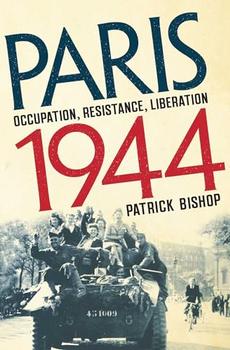
Occupation, Resistance, Liberation: A Social History
by Patrick Bishop
A moving, dramatic social history of the liberation of Paris in 1944, one of the most inspiring and momentous events of the twentieth century.
The fall of Paris to the Nazis on June 14th, 1940, was one of the darkest days of World War II. And the liberation of the city on August 25th, 1944, felt like the brightest.
The liberation was also the biggest party of the century: champagne flowed freely, total strangers embraced—it was a celebration of life renewed against the backdrop of the world's favorite city, as experienced by the likes of Ernest Hemingway, J. D. Salinger, Pablo Picasso, and Robert Capa.
But there was nothing preordained about this happy ending. Had things transpired differently, Paris might have gone down as a ghastly monument to Nazi nihilism.
Paris 1944—timed for the eightieth anniversary of the liberation of Paris—tells the story of those iridescent days in a startling new way. Cutting through decades of myth-making, the reader watches the city's fate hanging in the balance against the drama, heroism, joy, and suspense of one of the most explosive moments of the twentieth century.
"Bishop's portraits of major and minor figures develop into arresting subplots freighted with their own symbolism (the last performance that literary critic and outspoken fascist sympathizer Robert Brasillach attended before he went into hiding in 1944 was Jean-Paul Sartre's No Exit). This is a revelation." —Publishers Weekly (starred review)
"Intriguing perspectives that balance myths and realities about the occupation and liberation of Paris during World War II. A fascinating and enlightening narrative that serves as an entertaining social history of World War II–era Paris." —Kirkus Reviews
"Bishop's writing style is admirably unflowery, and his account is illuminated by an inspired choice of evocative testimony." —The Telegraph
"A wonderful book: droll, moving, with a cinematic eye and not a boring line in it. The book resembles some epic thriller, with vividly evoked characters all somewhere on the spectrum between collaboration and resistance, shame and glory." —The Observer
"Bishop contends in this splendid chronicle that the 1940 Nazi occupation and 1944 Allied liberation of Paris carried heavy symbolic weight. He uses the City of Light's 'mythic' status as the backbone for a fine-grained narrative of life before and during the war, showing how a sense of exceptionalism permeated the thinking of Nazi occupiers, fascist sympathizers, and resistance fighters alike. This is a revelation." — Paris '44. The way he assembles an unexpected cast of characters—J. D. Salinger, Ernest Hemingway and Robert Capa, to name just a few—gives a fresh, unexpected take on the liberation of Paris. This is very good popular history." —Julian Jackson, author of France on Trial: The Case of Marshal Pétain
"Riveting and powerfully written. Patrick Bishop has turned this tragic cautionary tale into a fascinating, shrewd and timely reflection on leadership in a time of crisis, and what can happen to personal ambition in the fevered atmosphere of war." —Henry Hemming
"An extraordinary moment of history brought to vivid, pulsing life. Rich with suspense and layered with intrigue." —Sinclair McKay
This information about Paris 1944 was first featured
in "The BookBrowse Review" - BookBrowse's membership magazine, and in our weekly "Publishing This Week" newsletter. Publication information is for the USA, and (unless stated otherwise) represents the first print edition. The reviews are necessarily limited to those that were available to us ahead of publication. If you are the publisher or author and feel that they do not properly reflect the range of media opinion now available, send us a message with the mainstream reviews that you would like to see added.
Any "Author Information" displayed below reflects the author's biography at the time this particular book was published.
Patrick Bishop is the author of Operation Jubilee as well as several bestselling histories of the Royal Air Force during the World War II, including Fighter Boys and Bomber Boys. He spent twenty-five years as a foreign correspondent covering major conflicts around the world. Patrick lives in England.
A library is a temple unabridged with priceless treasure...
Click Here to find out who said this, as well as discovering other famous literary quotes!
Your guide toexceptional books
BookBrowse seeks out and recommends the best in contemporary fiction and nonfiction—books that not only engage and entertain but also deepen our understanding of ourselves and the world around us.